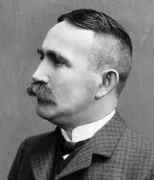Person: Wiman, Anders

Anders Wiman was a Swedish mathematician who worked on algebraic geometry and applications of group theory.
Mathematical Profile (Excerpt):
- Note that most biographies of Wiman give (incorrectly) his place of birth as Hammerlöf.
- Anders attended school in Lund, graduating from the secondary school in that city in 1885.
- He then devised the four-year mathematics course that Wiman followed, which put emphasise on function theory and particularly on a full range of geometric topics.
- One of Björling's students, Jakob Bergstedt, wrote a doctoral thesis which he completed in 1886 while Wiman was still an undergraduate.
- It was, therefore, a natural topic for Björling to suggest that Wiman study to see if he could succeed where Bergstedt had fallen short.
- Indeed, Wiman did succeed and submitted his thesis Klassifikation af regelytorna af sjette graden Ⓣ(Classification of ruled surfaces of the sixth degree) in 1892.
- Wiman's thesis is written in Swedish and hardly ever quoted, but it is a fine achievement and shows the sharp intellect and strong character of the author.
- Wiman was appointed as a docent in mathematics at the University of Lund in 1892.
- A paper on probability theory Über eine Wahrscheinlichkeitsaufgabe bei Kettenbruchentwickelungen Ⓣ(On a probability problem in continued fractions), which Wiman probably did not consider particularly important, appeared in 1900.
- Torsten Brodén, at that time a docent at Lund, had tried to revise Gyldén's work in a more rigorous fashion but Wiman was unhappy with Brodén's approach.
- In his own paper, which was a second attempt to put Gyldén's work on a rigorous basis, Wiman applied measure theory to the probabilistic problem.
- The extraordinary professorship at Uppsala was advertised and there were three applicants, Berger, von Koch and Wiman.
- They reviewed the work of the applicants and placed Wiman as their first choice, with von Koch in second place.
- This was not a judgment on the absolute merits of Wiman and von Koch as mathematicians, but rather an argument that both were fine mathematicians with von Koch's expertise being more in analysis than in algebra and number theory.
- The extraordinary professorship in algebra and number theory was offered to Wiman who happily accepted taking up the appointment on 5 December 1901.
- One of the topics that Wiman studied was the solubility of algebraic equations.
- Björling, the professor at Lund who had taught Wiman during his years there, retired in 1906 and Wiman was keen to return to his alma mater.
- But the friend was one day late and that is why Wiman, who had been the natural first choice, could not return to his alma mater.
- Torsten Brodén, who we mentioned above in connection with Wiman's use of measure theory in questions of probability, was appointed to the chair at Lund.
- However, Wiman did not have to wait long for an ordinary professorship since Uppsala promoted him to that position in 1906, shortly after his disappointment with failing to be considered for the chair at Lund.
- We have mentioned some of the topics that Wiman worked on, but it is worth noting the lasting influence that his contributions have made.
- One mark of this is the fact that MathSciNet lists around 100 papers with a concept named after Wiman in the title.
- For example, Wiman-Valiron theory, Wiman-Valiron discs, Wiman theorems for quasiregular mappings, Wiman surfaces, the Wiman inequality, Wiman's sextic, the Wiman-Valiron method for difference equations, the conjecture of Wiman, and the Wiman bound.
- Let us look now at Wiman's character and his influence on those around him.
- Wiman often talked about this with a shade of disappointment.
- Otherwise Wiman looked on the world with a positive eye - he was a composed and harmonic human being of a kind rarely met.
- Wiman, throughout his life, maintained a keen interest in the teaching of mathematics in secondary schools.
- Classical languages were Wiman's greatest interest outside the mathematical sciences.
- First let us say a little about Wiman's doctoral students.
- Wiman also taught Arne Beurling and influenced him greatly, but had retired before Beurling submitted his thesis.
- Next let us explain Wiman's role as a censor for the final examinations in Swedish schools.
- Wiman received many honours.
- Although Wiman spent a few years in Uppsala after he retired, he eventually returned to Lund and spent his final years there.
Born 11 February 1865, Hammarlöv, Skane County, Malmöhus, Sweden. Died 13 August 1959, Lund, Sweden.
View full biography at MacTutor
Tags relevant for this person:
Group Theory, Origin Sweden
Thank you to the contributors under CC BY-SA 4.0! 

- Github:
-

- non-Github:
- @J-J-O'Connor
- @E-F-Robertson
References
Adapted from other CC BY-SA 4.0 Sources:
- O’Connor, John J; Robertson, Edmund F: MacTutor History of Mathematics Archive
